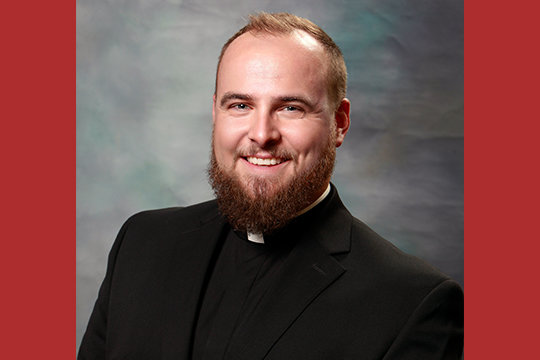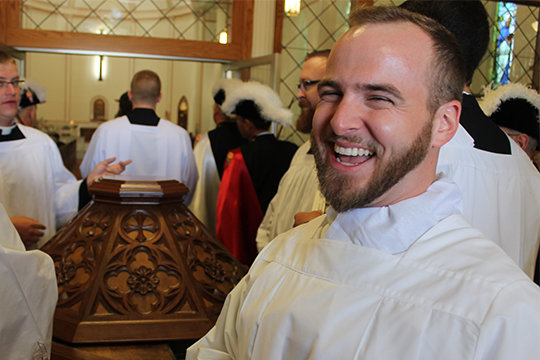Fr. Paul Clark begins work as vocation director, seeks more help from pastors, parishioners

Father Paul Clark knows that promoting vocations in the diocese is full-time work.
For everyone. Not just the director of the Diocesan Vocation Office.
“We are all full-time vocation directors,” Fr. Clark asserted. “If we truly believe what we say about Jesus Christ and His desire to call each of us to a sanctified way of life through our vocation, then we should all be eager to help the people we love listen and respond to that calling.”
Fr. Clark on July 1 became diocesan vocation director in addition to his other priestly assignments.
He will spend one day a week in his office in the Alphonse J. Schwartze Memorial Catholic Center in Jefferson City. Most of his time there will be spent meeting with men who are considering Priesthood for the diocese, and helping them with the application and discernment process.
He will also work with the Diocesan Vocation Committee to provide resources that help pastors and lay leadership promote vocations in parishes.
The rest of the week, he will serve as associate pastor of St. Thomas More Newman Center parish and part-time chaplain of Fr. Tolton Regional Catholic High School, both in Columbia.
He understands that promoting vocations is part of all of his assignments.
“It goes back to the call that each of us is given at baptism,” he said, “the fact that as a community, we stand with the families of those being baptized, to say we desire the fulfilment of this person’s vocation, we desire that one day they will join the saints — we desire that and we’re here to support and to encourage and to celebrate that.”
His position in the Chancery will no longer include visiting parishes to promote vocations as his predecessors did.
“But the resources are in place,” he said. “So our goal will be to assist the pastors and the staff and leadership in parishes to start with the universal call to holiness and foster a mindset, an environment, that brings that calling to life.”
Called to holiness
Every individual has a unique calling from God, a vocation, for which he or she was created in accordance with God’s intention from the beginning of time.
It’s the specific way God wants that person to live out the call to holiness, which everyone receives in baptism.
Just as the entire community of faith promises to help parents and godparents raise a newly baptized child to know, worship and imitate the Lord, that same community accepts responsibility for helping that child pursue his or her God-given vocation.
People discover their vocation through discernment, involving individual prayer and reflection as well as input from members of their family, friends and the local Church.
“It’s not something that can be delegated or outsourced to an individual or office,” said Fr. Clark.
Importance of families
Fr. Clark grew up in Edina and attended the old St. Joseph School, followed by Mary Immaculate School in Kirksville, Knox County R-1 High School in Edina, and Benedictine College in Atchison, Kansas, before entering the seminary.
He studied at Conception Seminary College in Conception for two years and undertook his theology studies at Kenrick-Glennon Seminary in St. Louis.
He spent summers as a seminarian at Ss. Peter & Paul Parish in Boonville, St. George Parish in Linn, Our Lady Help of Christians Parish in Frankenstein and St. Joseph Parish in Westphalia.
He served as a transitional deacon at Our Lady of Lourdes Parish in Columbia.
He was ordained to the Holy Priesthood in June of 2017.
He has served as associate pastor of St. Patrick Parish in Rolla and chaplain of the Rolla Newman Center; then as associate pastor of Our Lady of Lourdes Parish in Columbia and part-time chaplain at Fr. Tolton Regional Catholic High School.
He said his own experience of discerning a priestly calling points to the importance of family involvement.
“A man’s yes to the Priesthood is also a yes that comes from his family,” he said. “It’s not just the man making the gift of himself. His family also willingly offers him back to the Lord.”
Ideally, Catholic parents and families share the journey of discerning a vocation with their children, as opposed to putting up barriers to that discernment.
“We need to focus on creating an environment where parents can see all vocations as a beautiful path to holiness,” he said, “so that the desire wouldn’t be for one specific calling but simply to hear and respond to their particular call to holiness.”
A return to the Lord
Fr. Clark believes help for vocations will come from the work Father Stephen Jones is doing in visiting parishes throughout the diocese to promote stewardship.
“Answering a call from the Lord is so intimately connected to the idea of stewardship, it becomes a natural fruit of the heart of a steward,” Fr. Clark stated.
Catholic stewardship is rooted in gratitude for all the gifts God bestows on His people.
It comes from an understanding that all good things belong to God and are given by God in order for people to serve Him and one another in the best way possible.
All people are called to be holy, but how exactly to do that varies from person to person, because God created each individual with a unique purpose in mind.
That God-intended purpose is a person’s vocation, and it can only be discovered and acted upon with God’s help.
“That understanding prepares the heart in gratitude and frees it to fully respond to the call,” said Fr. Clark.
New horizons
Having served for two years as the chaplain of the Catholic Newman Center on the Missouri University of Science & Technology campus in Rolla, Fr. Clark got to encourage and accompany students who were discerning their vocation.
For some, that process starts in earnest as soon as they move away from home and begin entering into new conversations with God and the world around them.
“It’s always a privilege to be there to walk with them toward their vocation,” said Fr. Clark. “Filling out a letter of recommendation for a student going to seminary brings me the same joy as being able to celebrate the marriage of two of them.
“My two years in Rolla, I got to do both of those,” he stated. “There’s nothing as fulfilling as saying ‘yes’ to our vocation, and so being able to see that ‘yes’ in multiple vocations is exhilarating. It’s beautiful.”
Fostering those responses is something he hopes to continue while ministering to high school and college students in Columbia, he said.
Happiness and fulfillment
Fr. Clark plans to work with the Diocesan Vocation Committee “to strengthen the network that covers and reaches into all of the parishes.”
He pointed to a 2020 Center for Applied Research in the Apostolate (CARA) report, indicating that about 70 percent of men who consider Priesthood are invited and encouraged to do so by their parish priest.
“The committee helps make sure that’s happening in our diocese,” said Fr. Clark. “They help empower and equip a pastor and parish leaders to invite young people to be open and to believe that God wants what is good for them, that they will be happy, that they will be fulfilled.”
Several parishes have also set up their own vocation committees, using available resources to foster vocations in their communities.
“That goes back to each parish having the responsibility to be an environment where young people are encouraged to discern with open hearts,” he said.
Grace to spare
Fr. Clark pointed out that although the Church desperately needs more of all of them, there’s no shortcut to promoting more vocations to Priesthood, religious and consecrated single life, and holy marriage.
“What we’re doing is helping to promote an observable reality in each parish,” he said.
It’s hard work and requires taking the long view, but its success will be self-evident.
“The fruits of an authentic relationship with Christ are always tangible,” said Fr. Clark. “From each parish, we will see an increase in involvement from the young people as they respond with generous hearts. We will see an increase in all sacraments because those tangibly are our surest source of grace and interaction with the life of Christ.”
He stated that the current vocation crisis is really a crisis of commitment.
Paraphrasing a message Father Bradley Berhorst, a fellow priest of the diocese, recently preached to the seminarians, he stated: “The ‘vocation crisis’ isn’t that there aren’t enough priests. It’s that Christ is calling each and every one of us to a relationship with Him and some of us are saying ‘no.’”
Fr. Clark said he’s wholly reliant on the power of God’s love to transform hearts that have been conformed to the values of this world.
“Christ tells us again and again throughout His ministry that He alone is enough,” the priest noted. “In fact, in the feeding of the 5,000, with 12 bushel baskets to spare, He shows us that He’s not just enough, He’s more than enough. There will be abundance and excess.
“That’s a huge thing for us to pray with when we think of saying ‘yes’ to a vocation or ‘yes’ to anything that God is calling us to do,” he said.
Plenty of momentum
Fr. Clark pointed to the solid foundation set in place by his predecessors:
- Father Joseph Corel, who was vocation director when Fr. Clark entered the seminary;
- Father Gregory Oligschlaeger, who was vocation director when Fr. Clark was preparing for ordination and dealing with the last-minute doubts and obstacles;
- and most recently, Father Christopher Aubuchon and Father Joshua Duncan, who doubled down on promoting the power of Jesus’s priestly heart and the preparation for a generous, Spirit-led “yes.”
“They all set that trajectory that I’m now able to step into,” he said. “This next step of making it more parish-focused will be easier because of what those guys have set up.”
He asked for prayers for the diocese to become a Church made up of families that not only support and encourage a generous yes from young people but also celebrate that yes in every way imaginable.
“And as we enter more deeply into that prayer, each of us will actually become within our homes and our communities a piece of the answer to that prayer,” he said.
“This is a journey we’re all being invited to make together,” he stated. “I’m looking forward to all of that.”
Comments
Other items that may interest you
Services
The Catholic
Missourian
2207 W. Main St.
Jefferson City MO 65109-0914
(573) 635-9127
editor@diojeffcity.org







